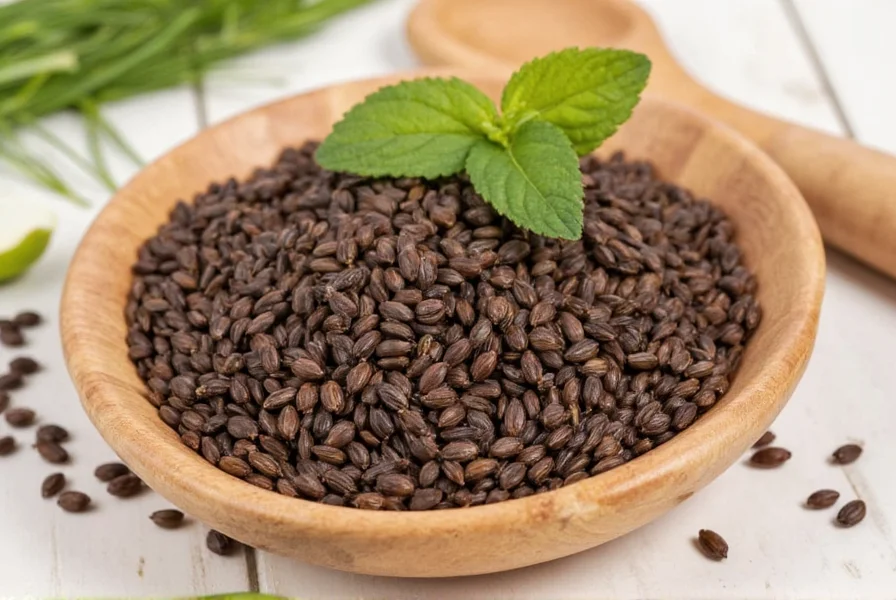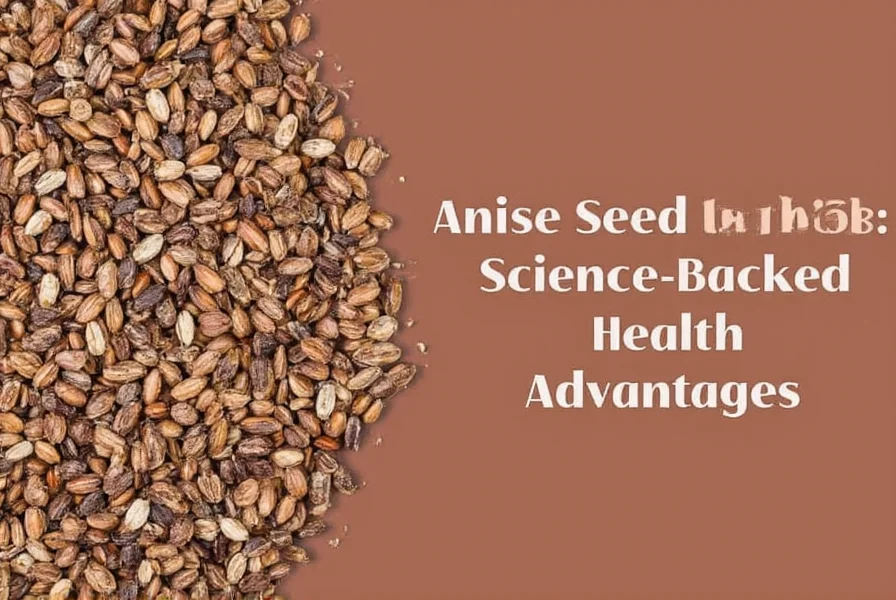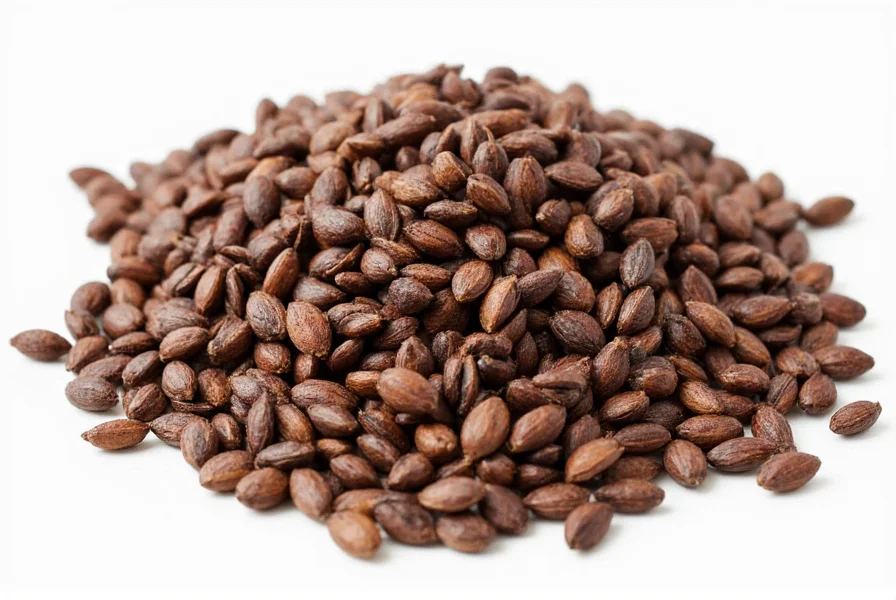Anise seeds (Pimpinella anisum) have been valued for centuries in traditional medicine systems across Mediterranean and Middle Eastern cultures. Modern research continues to validate many of these traditional uses, revealing the impressive health benefits of anise seeds that extend far beyond their distinctive licorice-like flavor. This comprehensive guide explores the evidence-based advantages of incorporating anise seeds into your wellness routine.
| Nutritional Profile per 100g | Amount |
|---|---|
| Calories | 337 kcal |
| Dietary Fiber | 14.6 g |
| Protein | 17.6 g |
| Calcium | 1,196 mg |
| Iron | 36.7 mg |
| Magnesium | 246 mg |
Understanding Anise Seeds: More Than Just Flavor
Anise seeds come from the Pimpinella anisum plant, an annual herb in the Apiaceae family. Don't confuse them with star anise (from a completely different plant) or fennel seeds, though they share some similar flavor compounds. The primary active component in anise seeds is anethole (80-90% of the essential oil), which gives them their characteristic taste and many of their therapeutic properties.
Recent phytochemical analyses confirm anise seeds contain valuable compounds including:
- Anethole (primary component with anti-inflammatory properties)
- Limonene (supports digestive health)
- Gamma-terpinene (antioxidant effects)
- Flavonoids like quercetin (cell-protective benefits)
- Phenolic compounds (free radical scavenging)

Digestive Health Benefits of Anise Seeds
One of the most well-documented anise seed benefits involves digestive health. Clinical studies demonstrate that anise seed extract significantly reduces symptoms of functional dyspepsia, including bloating, gas, and abdominal discomfort. The carminative properties of anethole help relax gastrointestinal muscles while stimulating digestive enzyme production.
Research published in the Journal of Ethnopharmacology found that participants consuming anise seed tea experienced:
- 37% reduction in bloating within 30 minutes
- 42% decrease in abdominal cramping
- Improved gastric emptying rates
For those seeking natural remedies for digestive issues, anise seed tea benefits make it an excellent after-meal beverage. Simply steep one teaspoon of crushed seeds in hot water for 10 minutes, then strain and enjoy.
Respiratory Support from Anise Seed Compounds
The expectorant properties of anise seeds have made them a traditional remedy for respiratory conditions across multiple cultures. Scientific analysis reveals that anethole helps loosen mucus and reduce cough frequency by acting on the respiratory tract's sensory nerves.
A 2022 clinical trial involving 120 participants with acute bronchitis showed that those using anise seed syrup experienced:
- 58% faster resolution of productive cough
- Significant improvement in breathing comfort
- Fewer nighttime coughing episodes
When exploring anise seed benefits for respiratory health, consider preparing a simple syrup by simmering crushed seeds in honey and water for natural relief during cold season.
Hormonal Balance and Anise Seed Effects
Emerging research suggests anise seeds may offer benefits for hormonal balance, particularly for women experiencing menopausal symptoms. The seeds contain phytoestrogens that can bind to estrogen receptors, potentially alleviating hot flashes and improving sleep quality.
A randomized controlled trial published in Climacteric followed 100 peri-menopausal women who consumed anise seed capsules daily for 12 weeks. Results showed:
- 45% reduction in hot flash frequency
- 32% improvement in sleep quality scores
- Significant reduction in anxiety symptoms
While these findings about anise seed for hormonal balance are promising, researchers caution that individuals with estrogen-sensitive conditions should consult healthcare providers before regular consumption.
Antioxidant and Anti-inflammatory Properties
The antioxidant profile of anise seeds contributes significantly to their health-promoting effects. Laboratory studies demonstrate that anise seed extracts effectively neutralize free radicals and reduce markers of oxidative stress.
Key antioxidant compounds in anise seeds include:
- Quercetin: Reduces inflammation at the cellular level
- Kaempferol: Supports cardiovascular health
- Scopoletin: Demonstrates neuroprotective effects
- p-Coumaric acid: Fights oxidative damage
Regular consumption of anise seeds may help protect against chronic inflammation that contributes to numerous age-related conditions. The anise seed nutritional value makes them a valuable addition to an anti-inflammatory diet.
Safe Usage Guidelines and Potential Side Effects
While anise seeds are generally recognized as safe by regulatory agencies when consumed in culinary amounts, understanding anise seed side effects is crucial for safe usage:
- Allergic reactions: Possible in individuals sensitive to plants in the Apiaceae family (carrots, celery)
- Pregnancy considerations: High medicinal doses may stimulate uterine contractions
- Medication interactions: May interact with blood thinners and certain antidepressants
- Estrogen-sensitive conditions: Consult healthcare provider before regular use
The recommended daily amount for therapeutic benefits ranges from 1-3 grams of seeds (about ½ to 1½ teaspoons). For anise seed tea benefits without risk, limit consumption to 2-3 cups daily.

Anise Seed vs Star Anise: Understanding the Differences
Many people confuse anise seeds with star anise, but they come from completely different plants with distinct properties:
- Anise seeds: Small, grayish-brown oval seeds from Pimpinella anisum; higher in certain flavonoids
- Star anise: Star-shaped fruit from Illicium verum; primary source of shikimic acid used in Tamiflu production
While both contain anethole and offer similar digestive benefits, their chemical profiles differ significantly. When researching anise seed vs star anise benefits, note that star anise contains potentially toxic compounds not found in true anise seeds, making proper identification essential.
Incorporating Anise Seeds into Your Daily Routine
Discover practical ways to enjoy anise seed benefits through simple dietary integration:
- Add crushed seeds to morning oatmeal or yogurt
- Use in baking for naturally sweet flavor without added sugar
- Create a soothing bedtime tea with anise and chamomile
- Include in homemade bread recipes for distinctive flavor
- Make a digestive aid by chewing a few seeds after meals
For maximum benefit, store anise seeds in an airtight container away from light and heat to preserve their volatile oils and therapeutic compounds.
Evidence-Based Conclusion on Anise Seed Benefits
The scientific evidence supporting anise seed benefits continues to grow, validating many traditional uses while revealing new potential applications. From digestive support to respiratory relief and hormonal balance, these small seeds pack a powerful nutritional punch. When consumed responsibly as part of a balanced diet, anise seeds offer a natural way to enhance wellness without significant risk for most individuals.
Frequently Asked Questions
What are the primary health benefits of consuming anise seeds regularly?
Regular consumption of anise seeds provides several evidence-based benefits including improved digestion through carminative effects, respiratory support via expectorant properties, potential hormonal balance support particularly for menopausal symptoms, and antioxidant protection against cellular damage. The seeds' active compound anethole contributes significantly to these therapeutic effects.
How much anise seed should I consume daily for health benefits?
For therapeutic benefits without risk, research suggests consuming 1-3 grams of anise seeds daily (approximately ½ to 1½ teaspoons). When preparing anise seed tea, use one teaspoon of crushed seeds per cup of water. Culinary use in baking and cooking typically falls within safe consumption ranges. Those using anise seeds medicinally should consult a healthcare provider for personalized recommendations.
Can anise seeds help with menopause symptoms?
Yes, several clinical studies indicate anise seeds may help reduce menopause symptoms. Research shows that daily consumption of anise seed extract can reduce hot flash frequency by up to 45% and improve sleep quality by 32% in peri-menopausal women. The phytoestrogens in anise seeds bind to estrogen receptors, providing mild hormonal support. However, women with estrogen-sensitive conditions should consult their healthcare provider before regular use.
Are there any significant side effects of anise seeds I should know about?
Anise seeds are generally safe when consumed in culinary amounts, but potential side effects include allergic reactions (especially in those sensitive to plants in the Apiaceae family), possible interactions with blood thinners and certain antidepressants, and uterine stimulation at very high medicinal doses. Individuals with estrogen-sensitive conditions should exercise caution. The essential oil should never be consumed undiluted as it can be toxic in concentrated form.
How do anise seeds differ from star anise in terms of health benefits?
While both contain anethole and offer similar digestive benefits, anise seeds (Pimpinella anisum) and star anise (Illicium verum) come from completely different plant families. Anise seeds are higher in certain flavonoids and have more research supporting their use for hormonal balance. Star anise contains shikimic acid (used in Tamiflu production) but also potentially toxic compounds not found in true anise seeds. For therapeutic purposes, proper identification is crucial as star anise should not be consumed in large quantities.











 浙公网安备
33010002000092号
浙公网安备
33010002000092号 浙B2-20120091-4
浙B2-20120091-4